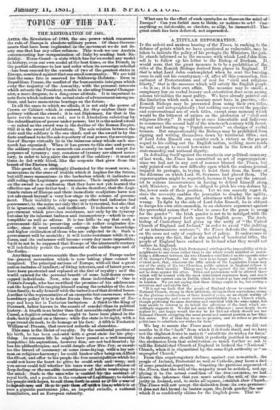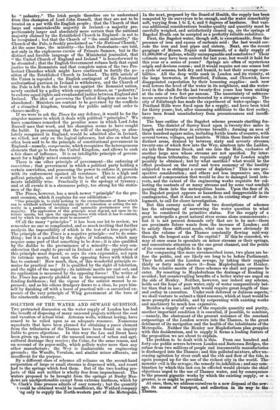A-TITULAR REFORIUTION.
IF.the ardent.and awdous bearing of the Times in rushing to the defence of points whielswe have questioned as ;rulnerible,:may be taken to indicate the policy- of his proteges the Ministers, the.p0-. lid stands: informed ea to the measure with which Lord John:Rua, • sell.is to -follow up his, letter to the Bishop, of Durham. It , would seem that the great measure is to be a prohibition, of the . Wee of the Romish Bishops- derived from places in Ragland. If that is what lord John, contemplated when he sent the burning.. cross to call out his countrymen—if, after 011 this commotion, this outburst of Protestantism: and.' of zeal for "civil and religieus liberty," that is the measure which will "satisfy the English people —be it so ; it is their own affiur- . The measure may be -small; a. sumptuary law 1311 verbal luxury- and. ostentation does seeintunong, solemn trivialities the most paltry. , WO have already pointed out the limitation which such a measure must have in practice;—tbe Romish Bishops. may be prevented- from using their own titles,,, formally and autographically ; but nothing can prevent the popular , and-conversational use of -such titles, except some Measure which would be the bitterest of-'satires on the -profession of "civil end.: religious liberty." It would be at once lamentable an4. ludicrous to-oommence the second half of the nineteenth century with:ferret- ing. out and hunting up "Popish recusants" on charges of verbal .. treason. . Rut unquestionably, the Bishops -may be psohibited. from •
signing and writing, themselves down by territsrial titles ; and. if Lerd John. Russell can consider such a victory as the proper-.
sequel to his.calling_out the Yinglish nation, nothing .more needs - be! said,..except to. record low-water - mark in the lowest ebb of ; statesmanship and national dignity.
Id defendingitself-against the remarks in :our politicalsumniary of last week,. the .Times. has committed- an act of supererogation; sincewe had, not in -any sort .of manner blamed the -Times,. but , only pointedoutthe new_ difficulty.upon. which the zealous journal impaled. its protegee, intrying. to hoist them fram, the 'horns .of thedilemma on which,Lord St: Germans had- placed them. The supererogation-might be regretted; because at has- put the journal- . ist_to serious inconvenience in having_ to defend himself along,. , , with' Ministers, so that he is obliged "to pitch his own defence by : the lower scale of -their position. Yet we can scarcely regret it, since the necessitysaithles the journalist to display, the- . :and; so to -speak,. the, graceful adroitness with.which he- can go wrong. To light by the side of Lord John Russell; he is obliged . to forego -his DWn statesmanship, in an-elaborate argument against' the-proverbial axionethat "what 'is • sauce- for. the goose 'is •sauqe, , for the gander ": the Irish, gander is not to be indulgedwith the sauce which is poured forth upon, the English pose. The Archr bishins, of. Canterbury had given up the unity of '" the United Chnrch of Engltuid, and Ireland," In order to , avoid "the inditing - of • an. inharmonious -sentence ".; the Times- defends, the disunioR, on the score not only of euphony but of poliey. , It endeavours to explain away the fact, that in the matter of territorial titles, the people of =England have endured in Ireland what they would not endure in 'England: "-No doubt, they [the Irish Protestants] attributed the impassibilitF of their neighbours to any cause rather than to one which wouldmanifest so -morti- fyingm. difference, between the-two Churches established.ou the opposite side-Ft of St: George's Channel.; but this vievr is no: longer :tenable. It is -quite,. imagined: The principal-nations -of Europe, with-all that a:great evident now, that,, whatever the. fifth . artiole of the Legislative men may- nation:includes. of ,intellecti of Hiring interestsand. of latent power, •say of the ointy. of the twoChurches, public opinion in yap:lank refuses. to have_been prostratedancl replaced, at the feet of royaltys asif the not donetheaoi,,,ftr tdevatn the-other Tith's ab:ddpoineet,,eazinstwtg ceanwhieli teit world existestfor the -:personal -benefit - of. some holt-dozen crown, which willibe treated 'with, the•most determined resistance here, and. much ' capped-individuals.- Now, who are these: individuals P- One is will-pass for current coin in Dublin which-is treated as base ancl.counterfifst• Francis Joseph, who, hark-sacrifice& the promises.of his adolescence in London. We arena saying,that.these things ought to be, but stating a . and the hopes of his ranging;-himself among the notables of the Auss notonous and undeniable fact.
.witlingly-supports it. We did not make this difference ; most deeply do. we - A Lou a- isno better-than-that miserable culpritof Hesse, deplore it; and happy would the day be for --Irel.ind which. should see her „a fugitive:criminal-who. ought to. have, been. placed in'thel National Church occupying the same pronct and assured .position as berfEng- doek,hutisi placed ors lb- thsetie e -while the stateishrought, .with_ a. lish sister. But, of that.day we see no-promise and we refuse as practical,. rope routukits meek; to do homage at his feet,. Atifth-is -Frederick • politicians to. substituteour. wishellor facts."
Willianrof -Prussia, -that creamed reduetio ad. absurdtim.- We- beg f to assure thee Times most sincerely, Ahab we did' nat.::: This-man is:the .11.elot of.royalty. By the accidental positionof 'ascribe to it the "fault" from which it siefendsitsolf, and we have
could not -have the heart M. give; he could. wish and.: weep; and people of Ireland,. Protestant its. well as Catholic, may learn ill fact .- -, you never could tell, whether his tears were the sober:effusion of: of some practie-aLimportance.. Granting the. previous argument of deep:feeling-or the-maudlin incontinence of habits weakening to'. 1 the .Tintes, that the willef- the majority must be satisfied, and.ap- the mind:. , Such is -the niaa-who is enabled by the accident .of. "plying it to the actual condition -of the two:countries, we had.. royal birth, and a position in the conclave, of 'Legitimacy-, to delude --1 drawn the- inference that-you -must satisfy.; the.will:-of "the ma'. . his -people ;Witir hopei, 'Oscan. theta forth-in arms as if -fir a warof , jority in Ireland), and, to. make -all' square, establish ,their .Church... inchapemiennesr and thetu.tocput.. them off with n hoaxs which is at.t The- -Times,wilb not( swept. thissiednotion from; its ownpromisestr once a gigantic pantomime joke, an imperial swindle, a national. -,it 1;Idee 'Ala fe00411114 1 tO,:beetoWAIPM. .*Earitb. gander4hrs saw "It is not our fault that the people of England choose to-eonsidel• their NationatChnrch, strong- in -their-affections, strongin their convictions; strong' -, ' in the glorious recollections of three hundred years, tuy an objoet.werthy of- la deeper sympathy and a more zealous guardianship than a Church which, thetigh professing the same doetrines and ennobled with.the same,nanie, has been unable to interest in its behalf the affections -of the. land which uu- not-the slightest desire to make it "substitute its wishes for facts." On the contrary, we should think it perfectly justified in carrying tha abstinencefrom that substitution so much further as not to calIthe Established Church of England in Ireland the "'National" Church, when, it is stigmatized brthe same high authority as "an-. unpeopled Church."
From thia supererogatory defence against our, noroottaek, the
be "pedantry." The Irish people therefore are to understand frbm this champion,of Lord John Russell, that they are not to be treated on a par with the English people; that the Church of that large and unmuitakeible majority in Ireland—a majority pro- portionately larger and absolutely more certain than the national majority claimed by the Established Church in England—is not to be recognized ; but that the Church of "the small minority," the Church of the Pale, is freshly proclaimed as" the National Church." At the same time, the minority—the Irish Protestants—are told, not only in the euphonous excuse of Primate Sumner, but in the -distinct and forcible language of the Ministerial journalist, that "the United Church of England and Ireland" is henceforward to be disunited ; that the English Government refuses both that equal justice to the Romanists and that complete union of the two Pro- testant Churches which might have continued to fortify the po- -sition of the Established Church in Ireland. The fifth article of the -Union is repealed ; the English contingent of the Protestant ecclesiastical garrison in Ireland is withdrawn, and the Church of the Pale is left to do the best it can against the Romanist nation, newly excited by a policy which expressly refuses, as "pedantry," to enforce equal rights and evenhanded justice between England and Ireland. The idea of governing the United Kingdom seems to be abandoned : Ministers are content to be governed by the conflicts of a disunited kingdom, trusting for public safety and order to -chance-medley.
If we were to ask the Times for any defence, it would be for the -singular manner in which it deals with political "principles." We have sometimes remarked the peculiar sense in which lord John Russell uses that word, and his champion seems to have caught the habit. In presuming that the will of the majority, so abso- lutely recognized in England, would be admitted also in Ireland, we relied, not only on the logical inference, but also on what has -often been said to be the principle of constitutional government in England—namely, compromise, which recognizes the heterogeneous elements that go to form the United Kingdom, and allows to each a fair share of influence. It is an intelligible principle of govern- ment for a highly mixed community.
There is one other principle of government—the enforcing of conviction ; that government in which a political party holding a -certain conviction, and possessing the power to enforce it, proceeds -with its enforcement against all resistance. This is a high and gallant principle, and it would be the best of all were all govern- ments infallibly wise. Practically it is the apology of tyranny ; and at all events it is a strenuous policy, too strong for the states- men of the day. The 7Tmea, however, has a much newer "principle" for the pre- sent occasion, which it explains for our edification— "Our principle is, to yield nothing to the encroachments of Rome which can be withheld without violating the right of toleration or setting the mi- nority in a position of invidious and untenable preiminence over the majority. The application of this principle must depend, not upon its in- trinsic merits, but upon the opposing forces with which it has to contend, .and by which its application must be measured."
Of all the many " principles " it has been our lot to review' we remember no one so complicated, and so much inviting that further analysis the impossibility of which is the test of a true principle. The principle of the Times is a negative principle—not to do some- thing ; but it is qualified by the rights of toleration, which may ,reqiure some part of that something to be done ; it is also qualified by the dislike to the preeminence of a minority—the very con- sideration that ought to prevail in Ireland : and the application of this prinoiple must depend, so says its own expounder, not upon its intrinsic merits, but upon the opposing forces with which it has to contend ! How much, then of this wonderful principle re- mains for practical use ? It is qualified by the right of toleration, and the right of the majority ; its intrinsic merits are cast out, and -its application is measured by the opposing forces ! The writer of the limes has gravely plodded on in the uncongenial task of de- fending feebleness ; but the vigour of the satirist cannot be re-
pres • and as his odious drudgery draws to a close, he pays him- self by re- pressed; off with a burst of practical wit—a sareastical ex- posure of the very principle of Whig government at the turn of the nineteenth century.



























 Previous page
Previous page